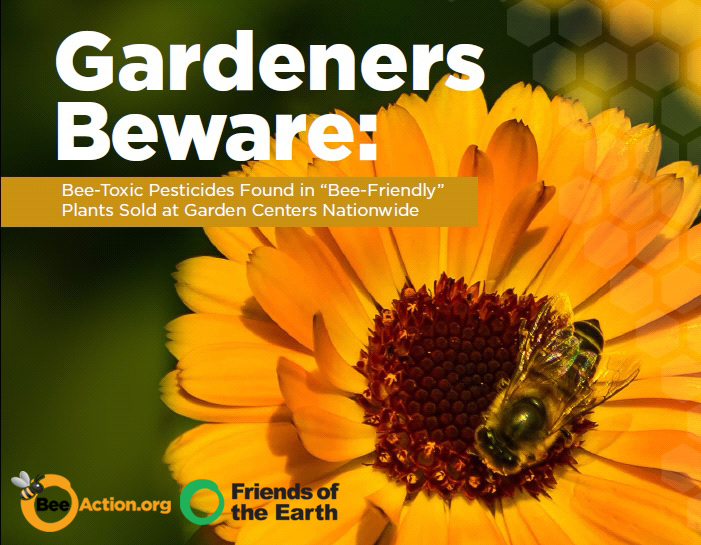- Blog
- Food & Agriculture
- Bee Action
- Gardeners beware: “Bee-friendly” plants may be poisoning your garden
Gardeners beware: “Bee-friendly” plants may be poisoning your garden

Donate Now!
Your contribution will benefit Friends of the Earth.
Stay Informed
Thanks for your interest in Friends of the Earth. You can find information about us and get in touch the following ways:
You may have heard that bees are key pollinators for one out of every three bites of food we eat. You may also know that bees are in grave trouble. But did you know that your own garden plants may be poisoning these bees?
In 2013, a report by Friends of the Earth US and the Pesticide Research Institute found 54 percent of common garden plants purchased at top garden retailers contained neurotoxic pesticides known as neonicotinoids at levels that could harm or kill bees and other pollinators and offer no warning to the consumer. The great news is that, thanks to thousands of individuals who demanded change, over 140 retailers including Home Depot, Lowe’s, Walmart, True Value and Costco are shifting away from selling plants that have been pre-treated with neonicotinoids. But it is still possible to purchase plants that contain these pesticides.
A growing body of science suggests neonicotinoids (neonics), which are used in agriculture and also for cosmetic purposes on garden plants, are a key factor in global bee declines. Beekeepers across the country have reported losses of 40-90 percent of their bees in recent years. In an effort to protect bees, the European Union banned the three most widely used neonic pesticides. The US Environmental Protection Agency lags far behind on addressing pollinator-toxic pesticides.
Neonics are the most widely used class of insecticides in the world. Studies show that these systemic pesticides, which pervade the entire plant from leaves to pollen, are toxic to bees even at low doses, weakening their immune systems and impairing their brains so that it’s hard to find food and return to their hives.
U.S. agriculture has become 48 times more toxic to bees and other insects since we began using neonicotinoids in the 1990s according to a peer-reviewed study by Friends of the Earth.
Bees are exposed to neonics not just through large scale agriculture, but also through common plants sold in nurseries and garden stores across the U.S. That means that we may be planting bee-killing plants in our home gardens instead of providing a bee sanctuary.
However, home gardeners can help bees flourish using the tips below to make your garden a real haven for bees.
Grow organic plants: Purchase organic plant starts or untreated seeds and grow your plants in organic potting soil. This will help provide safe food for bees.
Practice non-toxic pest control: Avoid using toxic pesticides in your garden. Look for pest control products that say OMRI on the package, that means they are approved for organic production. And use plants that that attract beneficial insects that prey on the undesirable insects in your garden. Use organic and eco-friendly pest management strategies using these tips.
Buy neonic-free products: Read the label and avoid using off-the-shelf neonicotinoid insecticides in your garden. Avoid products like these with the following active ingredients: imidacloprid, clothianidin, thiamethoxam, thiacloprid, dinotefuran and acetamiprid.
Take action: Join the Friends of the Earth BeeAction campaign. Buy bee-friendly organic food when you can – see how your grocery store measures up on protecting bees from toxic pesticides on Friends of the Earth’s Bee-Friendly Retailer Scorecard. You can also contact your member of Congress and encourage them to support the Saving America’s Pollinators Act. You can find more details and tips at www.BeeAction.org.
